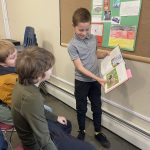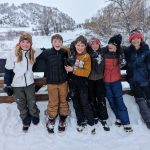October 24, 2023
At any hour of the school day, one might walk past Emma Terwilliger’s office on the second floor of the Charley Williams Lodge and notice her, one of our Learning Support Coordinators, through an open door in a brightly lit room, speaking, laughing, and strategizing with students. And her students’ reciprocal body language tells the story, as they clearly enjoy her advice and appreciate her feedback. Emma states, “I was drawn to working in learning support because I want to create inclusive educational spaces where students feel supported in learning. I believe that in order for these spaces to be possible, all students need to be able to show up in the classroom as their full and unapologetic selves and be valued and supported for who they are.” Indicative of her temperament, Emma’s office is vibrant and engaging, an inviting space for academic enrichment. The goal for the Learning Support Center across both campuses is, fundamentally, to build students’ confidence and self-reliance through individualized support. In the best of ways, therefore, Emma strives to assist every student in gaining autonomy by refining their individual approaches to their own work, a process that she develops in conjunction with her students during their regular meetings. She adds, “I consider positive relationship-building and empathetic, active listening to be at the core of my work with students. My hope is that students grow in responding to challenges with communication, self-awareness, and empathy, and they come to a deeper understanding of who they are and how they show up in the world. I want all students to learn the tools needed to respond to challenging situations with humility, kindness, a collaborative mindset, and to know their limits while prioritizing their own happiness and health.” She coaches students during their free periods on a regular basis, and her conversations involve not only the details of academic subject matter (what to know for class), but likewise the processes of time management, organization, and strategic planning (what to know about class, itself).
Emma’s work with students effectively addresses all aspects of the curriculum, which means that she needs to know something about everything. Fortunately for the SMS faculty, she is fully immersed in her role and highly visible on campus. She enjoys sitting in on classes (I’ve already had the pleasure of her attendance in both my 10th and 12th grade English sections, for example) and she’ll not only engage with the subject matter at hand from the vantage point of a student but simultaneously assess the ways in which her own students interact with the material presented so as to specify her guidance for their subsequent meetings. Moreover, she has formally presented to the entire US faculty regarding learning differences and accommodations, which helped us to collectively discuss strategies for enhancing student experiences and outcomes. Emma states, “In order to best support students in developing the resources and skills they need to be successful, I collaborate with faculty and staff to rethink what inclusion ultimately means in the classroom. How can we facilitate learning opportunities that are accessible for all students? How can we reconsider our approach to working with students with learning differences in ways that focus just as much on students’ unique strengths as we do on their areas of growth and challenges? And how might we make all of our instructional practices more inclusive?” Such questions lay at the heart of all teaching, and we’re fortunate that Emma brings genuine care, creativity, and resourcefulness to the process of helping us to find answers. By leveling the playing field for all, she assists everyone at SMS to realize the ambition of joyful learning.



